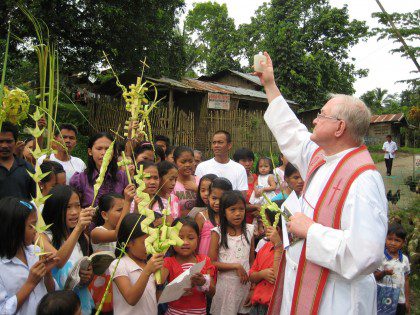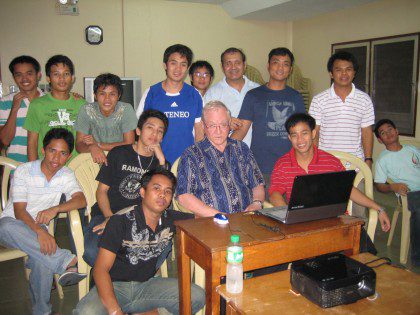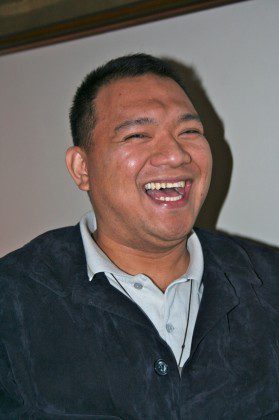A casserole of mixed accents
If you want to hear a casserole dish of English accents, spend some time in an SCJ community in the Philippines.
English, along with Filipino, is one of the two official languages of the Philippines. But for many, it is a second (or third, or fourth) language.
Filipinos who may be new to English are joined in formation by students from Vietnam and India; students who may also be struggling with a new language.
Added to this mix are the SCJ missionaries who serve the Philippines. English is the official language of the district yet there are generally no native English-speakers among its membership.
“The students hear English with Brazilian, Argentine, Italian, Polish and Indonesian accents,” said Fr. Bernie Rosinski, SCJ. “They seemingly hear every kind of English except that of a native speaker.”
To enhance students’ English skills, and to introduce them to other members of the international congregation, the district invites native English-speaking SCJs to spend a few weeks, or even a few months, with the Philippine formation community.
“I was like a visiting uncle,” said Fr. Frank Wittouck, SCJ, about his experience with the Philippine students in 2010. “I helped them with their English simply by speaking with them and sharing stories of the congregation as well as my own vocation.”
This year it was Fr. Bernie who headed to the Philippines to spend time with the students. Armed with a degree in linguistics from Georgetown University, he looked forward to applying what he had studied years ago to an ESL (English as a Second Language) program.
“One of the problems people generally have in learning English is that the language does a poor job of making the written alphabet correspond with spoken sounds,” said Fr. Bernie.
To get around this, Fr. Bernie decided to emphasize learning English through the spoken word, “learning English like babies do, by hearing,” he said.
The breviary became one of Fr. Bernie’s primary textbooks. “I asked the students not to look at the book but to listen to what I was saying,” he said. After repeating the prayers several times Fr. Bernie then had students pick up their psalm books and read the verses, matching what they had just heard to the words on the pages.
“When pronunciation mistakes were made, I corrected them,” he said. Often, the mistakes were the result of applying the reading patterns of a student’s native language to English.
“And in English, we see again and again that this just doesn’t work,” he said.
One of Fr. Bernie’s most popular teaching methods was movie night. “Dances With Wolves” was a hit among the students, who, like many outside of the United States, have a strong interest in Native American culture.
During a going-away celebration held in Fr. Bernie’s honor, some of his students imitated the Native American dances that they had seen in the movie.

A Dehonian Spirit
Besides teaching English, one of Fr. Bernie’s primary tasks in the Philippines was to share a bit of the international congregation with students. However, it was a two-way street. Being there allowed him the opportunity to get a sense of the young district.
“One thing that certainly struck me is that they have captured the Dehonian charism and are living it,” said Fr. Bernie. “They make community life a priority. Besides regularly getting together in local communities, the district holds monthly assemblies.”
The assemblies rotate throughout the district so that SCJs have an opportunity to take part in those that are close to them. “All are invited, but travel is not easy in many parts of the district,” said Fr. Bernie. “It isn’t possible for all SCJs to be at each assembly because of the distance but the gatherings are a priority and when possible, SCJs do go to them.”
Besides a commitment to each other in religious life, Fr. Bernie found that SCJs in the Philippines have a strong commitment to those they serve.
“The SCJs there have many responsibilities, not just a single ministry or job,” he said. When Fr. Bernie celebrated Mass for the students “the other priests, including Fr. Bene, the district superior, were out helping at parishes, celebrating Mass at chapels or mission stations.”
“It boggled my American mind to learn that a ‘parish’ could include up to 90 mission out-stations,” he added. The priests visit the missions on a rotating basis. “Before they go they send a text message to alert the mission president; it’s much less expensive than a phone call.”
Since the mission stations only receive infrequent visits from a priest, when a priest is there, the visit involves much more than liturgy. “During his visit the priest will do baptisms, hear confessions, work with the catechists and do the ‘business’ of the mission with the mission president.”
On weekends when a priest is not with the community, the mission president leads prayers and the catechist gives a presentation. The choir practices hymns.
Fr. Bernie noted that the mission chapel isn’t just for Sunday worship; often, it becomes a de facto community center. “Every mission has a sound system; often the only sound system in the area,” he said. “The chapel naturally becomes a gathering area for the community in these remote areas.”
He also emphasized that the missionaries minister to more than just SCJ parishes. “They are very involved with the local Church as a whole,” he said. “If there is an event or celebration at a parish, the SCJs always try to be present. They are very available.”

Quickly growing
The first SCJ team –– approximately a dozen men representing provinces from around the world –– arrived in the Philippines in 1989. Now, the district has 50 men in vows, and since 2004, several ordained Philippine SCJs.
The district has become a hub for education and formation in Asia. As noted earlier, Filipino SCJs are joined in initial formation by students from India and Vietnam. Manila, with its wealth of universities, attracts SCJs from throughout the world for advanced studies.
Besides formation, SCJ ministry in the Philippines is primarily parish-based; this year the district is assuming responsibility for two more parishes. The district also operates a shelter for abused women that was begun by a member of the first group of SCJ missionaries, Fr. Eduardo Agüero, SCJ, of the Argentine Province.
The Philippines has its own development office as well, started with seed money from the U.S. Province.
It’s because of its rapid growth that the district is in the process of changing its status from that of a district to a region. And thus Fr. Bernie had one more job while he was in the Philippines: helping the district prepare some of the paperwork necessary for the transition. After several years of working in the General Curia in Rome, and a few terms as provincial secretary, the minutia of administration comes as easily to him as the linguistic oddities of English.
Fr. Bernie returned to the United States in May. During his time in the Philippines he made several posts on the province blog. Click here to read them.
Filipino SCJ takes part in international program
The Philippine District invites people like Fr. Bernie Rosinski to spend time with its students to introduce them to the wider congregation. However, the district also sends some of its members outside of the country to learn first-hand about the Priests of the Sacred Heart, the international religious community of which they are a part.

Fr. Donald Somosa Longno, SCJ, ordained just last year, is one such student. He was among 17 SCJs from throughout the congregation who recently took part in a two-semester formation course in Rome. The course, held for the second time, is primarily for SCJs who will one day work in formation (the preparation of students for religious life as an SCJ).
“But for me, as someone still very young in my religious life, it was a good way to learn more about Fr. Dehon and the congregation,” said Fr. Donald.
Among the first Filipinos to profess vows, Fr. Donald joked that he and some of his classmates were like the first-born sons to a young couple. “We were the first students so our formators [teachers] were just learning with us, learning how to develop the education program,” he said. “I had a very good experience and appreciate my teachers.” However, he added, he knows that in some ways, both his teachers and his classmates were students. As the district develops, so too will the formation program; what was learned with the first students will enhance the program for future candidates and SCJs in formation.
At the international formation program Fr. Donald said that he learned much about the founder and the congregation.
“It was good to have so many teachers from the congregation,” he said. “Each had a different style.” During the first semester, 20 SCJs, along with several non-SCJs, did presentations on everything from Dehonian spirituality to the history of the congregation to the development of religious vocations. During the second semester students were in a program offered by the Salesian Pontifical University.
Besides learning Italian, the common language of the course, Fr. Donald said that one of the most difficult parts of the Rome experience was simply being away from the Philippines. This was his first time outside of the country.
“We are very family-oriented in the Philippines and to be away from my family and friends was hard for me at times,” he said. “But I appreciate that I have learned more about and gotten to know more of my SCJ family through this program.”
Fr. Donald returns to the Philippines in June.

